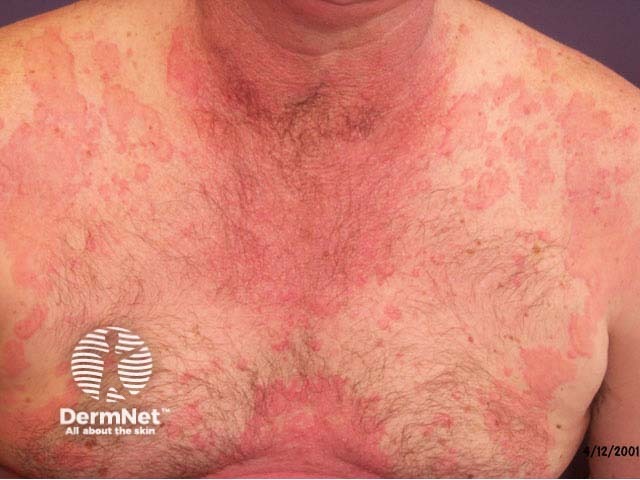Main menu
Common skin conditions

NEWS
Join DermNet PRO
Read more
Quick links
For each of the ten cases, study the image(s) and then answer the questions. You can click on the image to view a larger version if required.
Each case should take approximately five minutes to complete. There is a list of suggested further reading material at the end of the quiz.
When you finish the quiz, you can download a certificate.

What is the diagnosis?
Acute urticaria and angioedema. Acute urticaria is a disorder in which wealing has been present for less than six weeks. It is distinguished from chronic urticaria because the aetiology is different; acute urticaria is more likely to have an exogenous cause. It is often accompanied by angioedema, especially of lips or eyelids.
What underlying causes should you consider?
Acute urticaria may be a specific immunological reaction (allergy) to a food (most often eggs, peanuts or seafood), a drug (most often an antibiotic) or a hymenoptera sting. It can also be due to non-allergic reactions to food (histamine release provoked by salicylates or azo dyes), drugs (salicylates, opiates) or infections (hepatitis, sinusitis and many others) and unknown factors. Some patients will turn out to have chronic urticaria, believed to be autoimmune in origin.
What treatment would you recommend?
If a specific drug is suspected, it should be discontinued. In this patient, urticaria had been provoked by betahistine (a histamine analogue), prescribed a few days earlier for Meniere disease. The rash settled within 10 days of stopping the drug.
You should explain to the patient that acute urticaria may persist for days to weeks and sometimes fails to improve with antihistamines.
Prescribe a non-sedating antihistamine (loratadine 10mg, cetirizine 10mg or fexofenadine 180mg). Oral steroids do not alter the course of the disease but may be appropriate for 5 to 15 days in very severe cases.